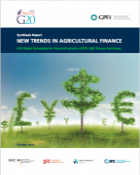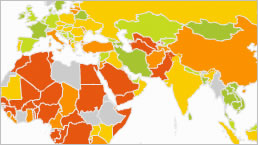Report | Nov 28, 2017
The GPFI requested the World Bank Group to undertake a survey amongst G20 countries on the effect of banks’ de-risking actions on the scale and scope of account closures of money transfer operators. The relatively low response rate from the private sector participants impaired some generalised observations, but the de-risking phenomenon was confirmed, although more evident in some jurisdictions than in others. The report, endorsed by G20 Leaders in November 2015 in Antalya, examines the impact on remittance service providers and provides a set of recommendations to deal with the situation.
Report | Nov 19, 2015
This OECD International Network on Financial Education (INFE) progress report on financial education for micro, small and medium-sized enterprises (MSMEs) and potential entrepreneurs provides an update on the main activities of the OECD/INFE in relation to financial education for MSMEs, including an Issue Note highlighting the importance of the INFE work-stream on MSMEs and its intended direction of work, as agreed by OECD/INFE members. This report was endorsed by G20 Leaders in November 2015 in Antalya.
Report | Nov 19, 2015
There are an estimated 215 million international migrants working in a globalised economy, the majority of whom are remitting money to their home country. The OECD, G20 and GPFI recognise the importance of such remittances in contributing to the financial resources of many countries. Remittances are also a vital component of household income for families, reducing poverty and creating opportunities for investment in education and enterprise. Well designed, low-cost remittance products can help to maximise the benefit of money sent abroad whilst also providing a valuable stepping stone towards increased financial inclusion in both the home and host country. A range of supply-side initiatives are underway to develop and roll-out such remittance products and to increase levels of financial
Report | Nov 24, 2015
This Policy Handbook, endorsed by G20 Leaders in November 2015 in Antalya, benefited from the experience of the more than 110 member economies of the OECD/INFE, and with direct contributions from over 65 of them, through an in-depth and iterative consultation process. Based on an overview of worldwide trends in the design and implementation of national strategies for financial education, it identifies and addresses the main related challenges, outlines relevant solutions - developed in countries with different economic and financial landscapes- and presents key lessons learnt. The Policy Handbook includes a checklist to guide policymakers and interested stakeholders in this process. The Policy Handbook focuses on responding to the following main practical and policy issues: Developing a
Report | Nov 19, 2015
This document, endorsed by G20 Leaders in November 2015 in Antalya, discusses the objectives and key components of the Core Competencies Framework on Financial Literacy for Youth developed by the OECD International Network on Financial Education (OECD/INFE), and presents the flexible, outcome-based, core competencies framework itself. It describes the basic level of financial literacy that is likely to be needed by all young people between the ages of 15 and 18 to fully and safely participate in economic and financial life. It also describes the more advanced competencies that may be expected among a portion of this age-group, particularly in countries where they may be required to make decisions about more sophisticated financial products. Together these competencies are described as
Report | Jan 22, 2016
Agricultural finance is crucial to support the growth of the agricultural sector. This is essential for food security, job creation, and overall economic growth. This synthesis report, endorsed by G20 Leaders in November 2015 in Antalya, presents a summary of research studies on five key areas of agricultural finance innovation prepared under the G20 Global Partnership for Financial Inclusion (GPFI) and the presentations and discussions of these during the “G20 Roundtable on Innovations in Agricultural Finance” convened on September 9, 2015 in Antalya, Turkey by the SME Finance Subgroup. After a brief background for setting the scene, the five key research areas presented in the synthesis are: a) Understanding Demand of Smallholder Households, b) Digital Financial Services, c) Financing
Report | Nov 19, 2015
G20 Leaders agreed in 2014 on the clear need to enable more women to participate in the global economy. Specifically, the 2014 G20 Leaders’ Communique established the goal of “reducing the gap in participation rates between men and women in our countries by 25 percent by 2025, taking into account national circumstances, to bring more than 100 million women into the labor force, significantly increasing global growth and reducing poverty and inequality.”Digital financial services are instrumental to achieving this goal, because they increase women’s financial autonomy, support women’s participation in the labor force, and improve the performance of their businesses. Digital financial services also advance the third G20 Principle for Innovative Financial Inclusion, which advocates the use of
Report | Nov 28, 2016
The GPFI Private Sector Engagement Strategy aims to advance and showcase the right type of dialogue at the global level. The Strategy seeks to maximize the positive contribution of the private sector to advance financial inclusion.This document is included in the annex of the G20 Leaders' Communiqué, endorsed by G20 Leaders after meeting in Antalya, Turkey on 15-16 November 2015.
Report | Nov 19, 2015
Small and medium-sized enterprises (SMEs) play a crucial role for employment, job creation, investment, innovation and economic growth around the world. They account for about 90% of businesses and more than 50% of employment worldwide, and are therefore crucial for the recovery of the world’s economy. Considering this important role, it is critical to ensure that viable SMEs around the world have access to the credit they need to expand.This G20 Action Plan on SME Financing, endorsed by the G20 Leaders in November 2015 in Antalya, outlines actions on financial market infrastructure reform in G20 countries and on a continued knowledge agenda.
Report | Nov 28, 2016
Since the publication of the first Global Partnership for Financial Inclusion (GPFI) White Paper in 2011, Global Standard-Setting Bodies and Financial Inclusion for the Poor – Toward Proportionate Standards and Guidance, global standard-setting bodies (SSBs) have taken fundamental steps on financial inclusion, acting on most of the observations and recommendations in the first edition.This second edition of the White Paper, Global Standard-Setting Bodies and Financial Inclusion: The Evolving Landscape, takes into account the considerable evolution of the financial inclusion landscape since 2011, concluding with observations and recommendations for further action. The White Paper aims to raise awareness of the changing landscape, to inform ongoing work by the SSBs and other global bodies,



